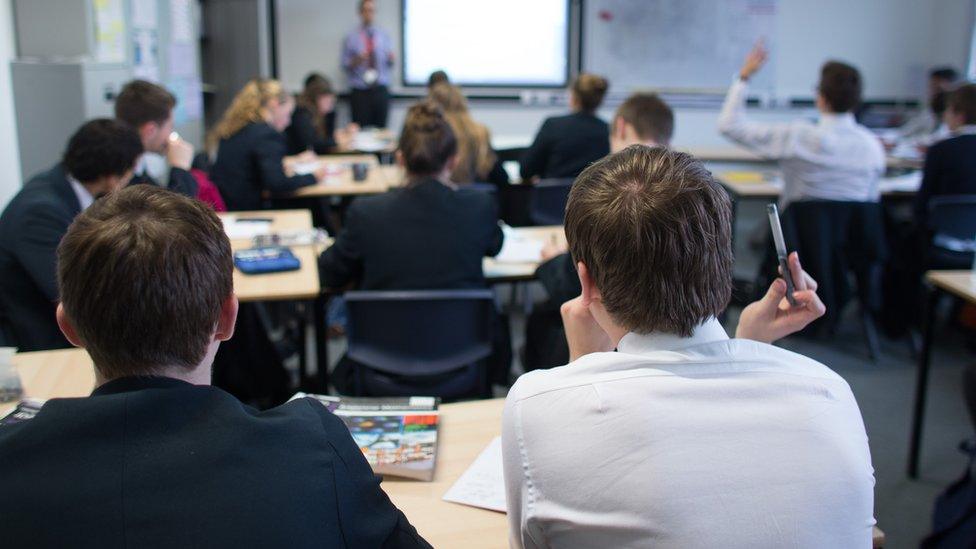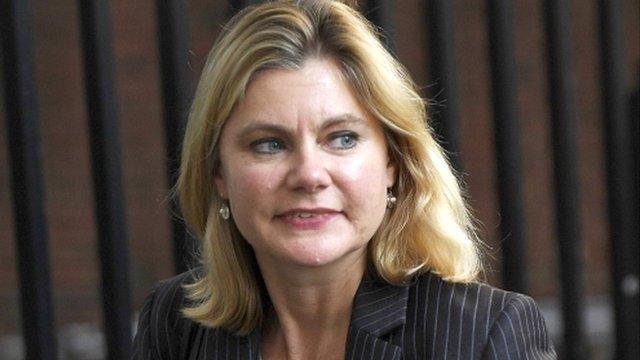Grammar schools must be open to 'ordinary families'
- Published
- comments
Justine Greening plans to lift the ban on new grammar schools
Education Secretary Justine Greening wants England's schools, including a new generation of grammars, to do more to help "ordinary working families".
The school system needs to support those who are struggling and not "the privileged few", she will say later.
But new government analysis shows a majority of selective school places go to more affluent families.
Labour says this adds to the evidence that grammar schools do not support social mobility.
These "ordinary working families" are defined as not the poorest, but living on "modest incomes", and likely to live in suburbs and coastal towns away from London.
'Ordinary' family income
Ms Greening said they could be a family with a "household income of around £33,000".
The Department for Work and Pensions recently produced figures showing how family size could change financial needs - and how that could affect being above or below average income.
In the mid-point for earnings, the figures showed that a couple with no children earning £25,100 had an equivalent income to a single person earning £16,800 and a family with two young children earning £35,100.
Official figures now show that more than two thirds of child poverty is now in working families, reflecting changes in financial hardship and stagnation in wages.
Helping these struggling, working families, missed by other poverty measures, has become a focus of Ms Greening's education reforms.
It is also addressing a question about admissions policies for new grammar schools - with the suggestion that a fair intake needed to reflect more than counting the number of pupils eligible for free school meals.
What are 'ordinary working families'?
Former grammar pupils say how school changed their lives
Free meals 'unreliable poverty measure'
Ms Greening said she wanted grammars to do much more to ensure access for children from all backgrounds.
The current dominance of middle class families in taking places was a "case for not keeping the status quo", she told BBC Radio 4's Today programme.
But Ms Greening declined to say whether she wanted grammars to have quotas to ensure a more mixed social intake
Angela Rayner says that the government is "cooking the books" on evidence about grammar schools
In a speech at St Mary's University in Twickenham the education secretary said that "ordinary working families shouldn't have to 'make do'", arguing they are "the backbone of our economy, of our country".
The education secretary said that these families "need more good schools".
"I believe that selection, in new, 21st Century state grammar schools, will add to the options available to young people, to truly help make the most of their talents.
"And grammars should not just be for one better off group in society to attend. We want to see more children from disadvantaged families get into grammars - that's vital."
Admissions rules
The education secretary said all grammar schools should change their admissions code to give priority to disadvantaged children.
Ms Greening said "many young people from an ordinary working class background already attend our existing grammar schools".

But Labour's shadow education secretary Angela Rayner said the government had "cooked the books", but still could not "hide from the fact that grammar schools do not aid social mobility".
"In effect they've not been able to find the evidence to back up their ideological policy, so they've created some themselves."
Liberal Democrat leader Tim Farron said that "pupils of working families are getting stuffed by this plan, yet again".
"Rather than making every state school excellent the government want to spend more cash on another ideological experiment."
But John Blake, head of education at the Policy Exchange think tank, said: "It's good to see the government using data to move beyond the overly simplistic division between those who receive free schools and those who don't."
Free meals 'unreliable measure'
Head teachers' leader Russell Hobby said the government seemed "fixated" on expanding academic selection.
"Despite all the evidence showing the harmful effects on social mobility, the government is committed to delivering a policy for the few at the expense of the many," said Mr Hobby.
Richard Watts of the Local Government Association said that local authorities "must have a say over whether or not selective schools are introduced in non-selective areas".
A consultation published by the government on Wednesday, examining how schools should support such "ordinary working families", shows affluent children are currently much more likely to take places in grammar schools.
The consultation shows 36% of places are taken by children from families with below-average incomes but not receiving free meals, compared with 53% of places taken by families with above-average incomes.
Education Secretary Justine Greening tells Today she wants new wave of grammars to be open to all
In non-selective secondary schools, there are 35% of pupils from these "ordinary" families, and 32% from more affluent families, a much lower proportion than in grammars.
The analysis also says these "ordinary families" are more likely to miss out on places in outstanding schools, compared with children from better-off families.
The consultation says while there has been much attention and support for the very poorest families, there is "very limited understanding" of the experiences of children in families of "modest incomes".
St Mary's University, where Ms Greening is speaking, recently published research showing that counting pupils eligible for free school meals had become an unreliable measure of poverty.
The researchers said that focusing on these pupils missed families who might be working multiple jobs and living in precarious financial circumstances, but above the threshold for free meals.
The study warned that using proportions of free school meal pupils had also become an unreliable way of assessing the fairness of admissions systems.
- Published13 April 2017

- Published4 April 2017

- Published30 March 2017

- Published4 October 2016
